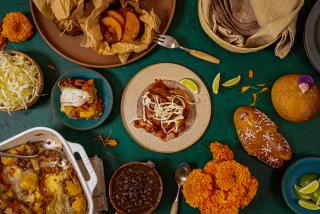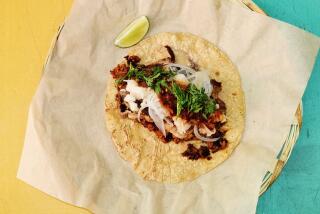How to Enjoy Those Very Hot Mexican Spices Without Getting Overheated
- Share via
Beads of sweat on your forehead, tears in your eyes and searing fire on your tongue.
An exotic tropical disease? No, merely the result of a very spicy meal in Mexico, the ultimate pleasure for many travelers. Such a meal is a delight that need not be regretted a few hours later.
All Mexican food is not summer-sun hot. But muy picante (very spicy) Mexican food may be the spiciest in the world. In fact, habanero chile peppers, grown in the Yucatan and used to season fiercely hot dishes, are said to be the spiciest chiles in the world.
Why do people enjoy having their mouths flare, their sinuses unleash and their digestive systems bubble?
Perhaps because hot spices make us salivate, and saliva helps enhance the flavor of food.
Yet the more you eat, the more you may need because the main ingredient in chiles, a chemical called capsaicin, progressively numbs the mouth’s sensory cells and it then takes more spice to get the desired effect.
Few Words of Spanish
Even if a spicy food is not your thing, you can enjoy Mexican cuisine and still protect your mouth from fire. All you need to know is a few words of Spanish . . . and to use those words correctly.
In English the word “hot” indicates both elevated temperature and spiciness. This is not the case south of the border. In Mexico if you do not want spicy food, say no picante (no spice). Do not say no caliente , which in Spanish means hot in temperature, not hot in flavor.
But if you like spicy food, ask for it muy picante y muy caliente , spicy and hot in temperature.
In Mexico well-heated food can help you avoid illness. Heat kills microorganisms. Spices don’t.
Many restaurants in Mexico serve small dishes of spicy sauce and spicy chopped greens along with dinner. Generally, these spices are muy, muy picante , may not have been cooked properly and may have been improperly stored after cooking. Improper cooking and storage adds to the chances of contamination.
Beer Is Best
If you accidentally bite into a morsel of food that is spicier than you anticipated, quickly grab for milk, beer or wine to neutralize the pain. They are more effective than water. But drink milk only at established restaurants and hotels. Beer is a safer bet.
Are properly-prepared, spicy Mexican meals harmful to your intestinal system? Dr. David Y. Graham and colleagues of the Digestive Disease Section at Baylor College of Medicine in Houston used miniature TV cameras to study the stomach and intestines of volunteers.
Half ate bland meals, the other half very spicy Mexican dishes. The finding: “While capsaicin-containing spices increase acidity and are often associated with stomach distress, the spices do not appear to cause any damage.”
More to Read
Eat your way across L.A.
Get our weekly Tasting Notes newsletter for reviews, news and more.
You may occasionally receive promotional content from the Los Angeles Times.










